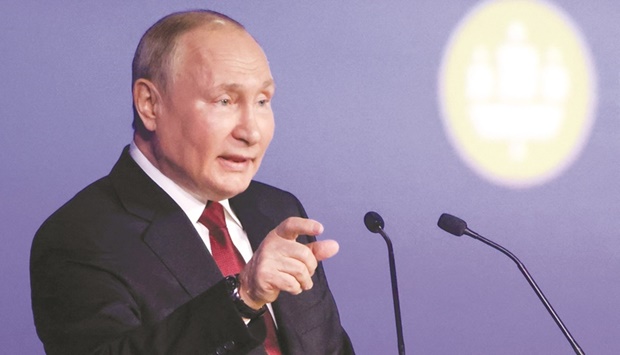Russian President Vladimir Putin is betting on an ancient weapon more powerful than any of the missiles now being supplied by the United States and its European allies to Ukraine: time.
Nearly five months since Putin ordered the February 24 invasion that has devastated parts of Ukraine, Russia is hoping that Western resolve will be sapped by alarm over surging global energy and food prices that the war has helped to stoke.
Russian officials and state television openly gloat about the fall of British and Italian prime ministers Boris Johnson and Mario Draghi, depicting their resignations as a result of the “self-harming” sanctions the West imposed on Russia.
Who in the West, they ask, will be the next leader to fall?
Putin, who turns 70 in October, told the West this month he was just getting started in Ukraine and dared the United States — which enjoys economic and conventional military superiority over Russia — to try to defeat Moscow. It would, he said, fail.
“Putin’s bet is that he can succeed in a grinding war of attrition,” CIA Director William Burns, a former US ambassador to Moscow, told the Aspen Security Forum this week.
The former KGB spy is betting he can “strangle the Ukrainian economy, and wear down the European publics and leaderships, and he can wear down the United States because in Putin’s view Americans always suffer from attention deficit disorder and will, you know, get distracted by something else,” Burns said.
Burns, who was sent by US President Joe Biden to Moscow last November to warn Putin of the consequences of invading Ukraine, said he thought the Russian leader’s bet would fail.
But the Kremlin shows no sign of backing down, saying Russia will achieve all of its aims in Ukraine.
Putin’s foreign minister of 18 years, Sergei Lavrov, said on Wednesday Russia’s ambitions in Ukraine now went far beyond the eastern Donbas region to include a swathe of territory in the south and “a number of other territories”.
Annexation
The US National Security Council said on Tuesday it had intelligence that Russia was preparing to annex all of Donbas as well as land along Ukraine’s southern coastline including Kherson and Zaporizhzhia.
This would formalise Russian control over more than 18% of Ukrainian territory in addition to around 4.5% that Moscow took in 2014 by annexing Crimea.
If the West supplies more longer-range weapons to Ukraine, such as high mobility artillery rocket systems (HIMARS), Lavrov said, Russia’s territorial appetite will grow further.
“The rhetorical message Lavrov seems to be sending to the West is: the longer the war lasts, the more we claim,” said Vladislav Zubok, professor of international history at the London School of Economics.
“It could be pure bluff but I would not be surprised if Russia wanted to keep the southern territories.”
The United States, which has provided more than $8bn in security assistance to Ukraine, will send four more HIMARS to Ukraine, US Defence Secretary Lloyd Austin said.
So how does it end in Ukraine?
“My best guess is that this ends with a stalemate close to the current battle lines, perhaps an ugly armistice,” said Barry R Posen, Ford International Professor of Political Science at the Massachusetts Institute of Technology.
“You’re headed for an ugly period of political-military experimentation followed by an uncomfortable and un-legitimated settlement into a frozen conflict.”
Great power?
Ever since Putin was handed the nuclear briefcase by Boris Yeltsin on the last day of 1999, his overriding priority has been to restore at least some of the great power status which Moscow lost when the Soviet Union collapsed in 1991.
Putin has repeatedly railed against the United States for driving Nato’s eastward expansion, especially its courting of ex-Soviet republics such as Ukraine and Georgia which Russia regards as part of its own sphere of influence.
Putin has suggested such moves are aimed at deliberately weakening and even destroying Russia. He has given a variety of justifications for his invasion of Ukraine but increasingly casts it as an existential battle with the West whose outcome will reshape the global political order.
With Russia still exporting its vast natural resource wealth and with crucial backing from China, Putin is gambling that Russia can slowly constrict Ukraine while being able to endure more pain than a West that he sees as decadent.
The costs of that gamble in blood and treasure are immense.
US intelligence estimates that some 15,000 Russians have been killed so far in Ukraine — equal to the total Soviet death toll during Moscow’s occupation of Afghanistan in 1979-1989.
Ukrainian losses are probably a little less than that, US intelligence believes, Burns said. Neither Ukraine nor Russia has given detailed estimates of their own losses.
“(Putin) really is an apostle of payback,” Burns said. “He is convinced that his destiny... is to restore Russia as a great power.”
Only time will tell if the most perilous bet of Putin’s 22-year rule will pay off. — Reuters

Russian President Vladimir Putin delivers a speech during a session of the St Petersburg International Economic Forum (SPIEF) in Saint Petersburg last month. (Reuters)
